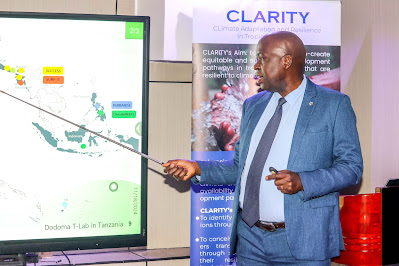The Sokoine University of Agriculture (SUA) through the Climate Change and Resilience Project in the Tropical Drylands (CLARITY) is conducting research to identify technologies and materials that will remove toxic chemicals from well water using plants that are available in the community.

The study was explained by the Master’s Degree student from SUA who is conducting the study, Poliect Onesmo Ngowi, while speaking to SUA Media in Dodoma on November 18, 2024 at the Workshop to introduce the CLARITY International Advisory Committee, a workshop that also brought together the Supervisors of Bachelor’s students of Masters and Ph.D. who are under the project as well as the main stakeholders in the implementation of the CLARITY project who evaluated the progress of the project.

Mr. Ngowi has said that at the end of the research, he hopes to find technology and inexpensive materials that will help Tanzanians absorb toxins from the water, “when the poison is removed, it will enable them to get clean and safe water that will help them improve their health because unclean water with toxins causes diseases in humans and animals, plants dying and crops not doing well”.
SUA, through the CLARITY project, is also conducting a study on the effects of climate change on the availability of underground water in areas of dry tropical plains in the Dodoma region, which is being conducted by the College’s PhD student Evarest Abraham, who said the results of the study that will facilitate the formulation of various policies and strategies that will enable managing water resources sustainably and create equality in water access.

And Student Brenda Mndolwa, who is also studying for a PhD at SUA, who is doing research on the availability of underground water and how that water can be affected by climate change and land use changes in dry tropical areas in Dodoma region, has thanked the CLARITY project for giving them funding and asking them to continue to do the same for others as more research is still needed in water issues to help the community and the nation as a whole.
On his part, Prof. Faith Mabiki from College of Natural and Applied Science SUA who specializes in Chemistry who is the Supervisor of the student Poliect Ngowi said that it is very important to have young researchers especially in water areas that bring benefits to society because young people have longer lives and the ability to to reach the community quickly by using various scientific and research methods.

Chief Leader of the CLARITY Project Prof. Japhet Kashaigili, who is also the Director of the Directorate of Postgraduate Studies, Research, Technology Transfer and Professional Advice at SUA, said that the project is building capacity for students where until now it is sponsoring 2 PhD students and 4 Master’s degrees, “basically we are doing well and we are doing well with this project, our students are at the stage of implementing their research by continuing to collect data where the research will contribute significantly to this project achieving its goals”.
The project consultant from Tanzania Prof. Damas Mashauri praised the progress achieved by the CLARITY project and promised to give his advice as much as possible so that the project can be a great success “we will advise the expertise of bringing water from Lake Victoria to Dodoma or drilling wells in Mzake to increase water in the city of Dodoma which will be well, what method should they use by looking at the cost and the environment they will decide how to take the advice in implementation”.

The Head of the Smart Center for Water Resources from the Ministry of Water, Engineer Hosea Sanga has said that due to the existence of many challenges facing the water sector, including pollution and invasion of water sources, “I think it is very important to do these studies and I ask our colleagues of CLARITY to continue conducting research in collaboration with the community more closely so that the results obtained will go directly into the formulation of policies that will bring productivity to the community”.
Giving a word of thanks to the Assistant Leader of the Project who is also the Supervisor of Social Science activities Dr. Devotha Mosha said that they are looking at all the groups that are affected by climate change “we are looking at how these changes in various economic sectors in this country affect the distribution of water and see if there is balance or which group is more affected, the goal is later to come up with methods or ways that will help equitable access to water”.
The CLARITY project is funded by the International Development Research Center (IDRC Canada), Foreign, Commonwealth and Development Office (FCDO, UK) under the Climate Adaptation and Resilience (CLARE) initiative.




